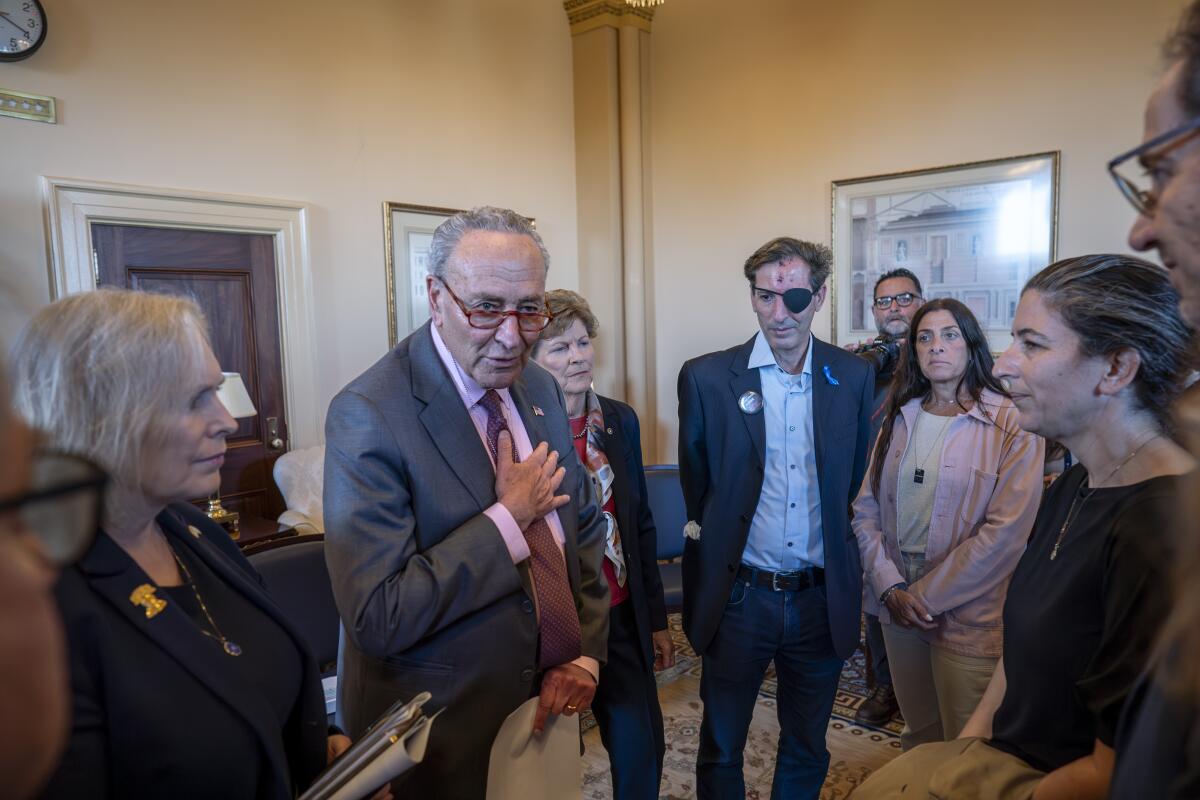Inside the desperate lobbying effort to push the U.S. to save hostages held by Hamas

WASHINGTON — A few days after Israeli soldiers knocked on his door near Tel Aviv to tell him that his son had been captured by Hamas, Ruby Chen hopped on a plane to New York.
He’s been patiently retelling his story ever since: outside the United Nations Tuesday, in all-day meetings with members of Congress from both parties Thursday, to Vice President Kamala Harris on Friday. He met with the FBI, State Department negotiators and New York City officials throughout the week.
“We are a delegation of U.S. citizens,” Chen, a 55-year-old tech executive, said Friday in an interview at a Washington synagogue where he was about to address a congregation gathering under heavy security for Sabbath evening services.
“Our expectation — and what we’ve seen — is that the U.S. is not taking a supporting role only, but actually an active role in the negotiation process,” Chen said.
Chen, who was raised in New York and has dual citizenship, was joined by about a dozen other American families of captives who have swarmed the Capitol last week, compartmentalizing their anguish at times but never hiding it. Chen wears a patch over his left eye, the result of a stress-induced shingles outbreak. On Thursday night, he passed out in his hotel room five minutes into a Lakers game.
But Chen does not stop answering questions. Keeping his 19-year-old son, Itay, in the public eye is too important. He asks the lawmakers and reporters he meets to imagine how they’d feel if their own child were held hostage. He and the other families believe the U.S. can leverage influence with partners in the region “to solve this humanitarian issue as soon as possible” and free the 10 Americans among more than 200 hostages being held by Hamas.
An aerospace lobbyist with American and Israeli clients who is working with the group said the attention is their best hope and that they were making plans to sustain it.
“In the past, Hamas has kept Israelis for years as hostages,” said the lobbyist, who asked to remain anonymous for security reasons. “They fear if they don’t have continued presence in the U.S., they will become out of sight, out of mind.”
Itay, who was also born in the U.S., was on active duty with the Israel Defense Forces guarding an agricultural settlement near the Gaza border when he was captured after fighting Hamas invaders, Chen said. He has not been able to contact his family and Hamas has not allowed independent doctors or observers to check on his well-being, Chen said.
Chen said American officials have been fully engaged, beginning with an Oct. 13 Zoom call President Biden held with the families. The call was supposed to last 15 minutes, but Biden brushed aside aides and stayed with the families for 90 minutes. His Thursday meetings included both Texas Sen. Ted Cruz, one of the most conservative Republicans, and Senate Majority Leader Charles E. Schumer, the New York Democrat.
Friday’s meeting with Harris at the State Department was emotional. It was led by Roger Carstens, special presidential envoy for hostage affairs, and included Raaj Maan, who leads the FBI hostage recovery fusion cell, along with other high-ranking administration and White House officials.
Harris was joined by her husband, Doug Emhoff, and stayed for more than an hour, hugging the families and asking them to recount their lives before and since the Oct. 7 Hamas attack.
Harris told the group that she and her husband took their relatives’ captivity personally, that the administration was making their release its priority and that they should not feel alone as they fight for them, according to a U.S. official who was present and requested anonymity to discuss the sensitive meeting.
Many of the lawmakers they met with told the families they planned to wear metal tags the group had made with a message in Hebrew and English to “Bring them home — Now!”
American officials have withheld many details of their work trying to free the hostages, citing security concerns, Chen said.
“To some extent, I can understand why,” he said. “But it does create a level of frustration.”
Qatar has publicly helped negotiate the release of hostages, but Chen said there are parallel tracks with other countries that he would not name. So far, two Americans and two Israelis have been released.
Chen said the group was also frustrated that they could not meet with U.N. officials, whom he said were interested in other aspects of the conflict.
As Chen met with a Times reporter Friday, Israel was intensifying strikes on Gaza ahead of an expected ground invasion, which could further endanger captives. Chen said he did not take a position on the invasion when he spoke with American officials.
“Obviously, a human being that has a kid in Gaza would be worried,” he said. “But can I make an educated decision on that? That’s not my profession.”
More to Read
Get the L.A. Times Politics newsletter
Deeply reported insights into legislation, politics and policy from Sacramento, Washington and beyond. In your inbox three times per week.
You may occasionally receive promotional content from the Los Angeles Times.











